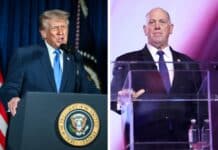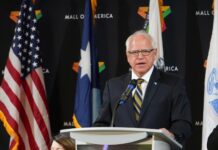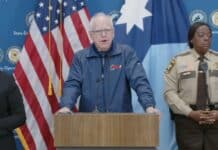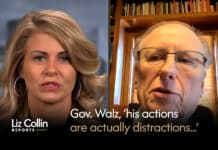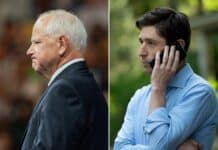Calling climate change an “existential threat,” Gov. Tim Walz has announced an “ambitious” plan to combat its effects.
Alongside Lt. Gov. Peggy Flanagan and various state leaders, Walz officially launched Minnesota’s Climate Action Framework this past Friday to help meet several climate-related goals over the coming decades.
The Climate Action Framework, spelled out in a nearly 70-page document, was developed by the Walz administration’s Climate Change Subcabinet and Advisory Council on Climate Change. Its overall vision for the state of Minnesota includes net zero carbon emissions by 2050, “resiliency” in the face of climate “challenges,” and the tackling of “disproportionate climate change impacts” on certain “communities.”
To realize that vision, the document proposes six goals: investing in “equitable” and “sustainable” public transportation, increasing carbon storage while cutting down emissions, creating “resilient communities,” achieving carbon-free electricity, raising awareness on the “health impacts of climate change,” and transitioning to a “clean economy.”
Dr. Scott Jensen, the Republican gubernatorial candidate looking to unseat Walz, scoffed at the plan as a “political document meant to shore up his base … rather than a serious solution for Minnesota’s energy problems.”
“In a 69-page document that is supposed to lay out Minnesota’s energy future for at least the next three decades, not once does Governor Walz mention the most reliable energy source that’s free of greenhouse gas emissions during operation: nuclear,” Jensen wrote in a recent statement. “However, Governor Walz’s report does mention the words ‘equity’ or ‘equitable’ 40 times.”
Critics have panned Walz’s energy policy as economically unsound and highly disruptive, particularly the adoption of California’s “clean car” rules, which are the subject of a current lawsuit against the Minnesota Pollution Control Agency. In his own energy plan, Jensen has vowed to repeal these rules.
The state of California, however, recently amended its emission standards to phase out the sale of gasoline-powered vehicles by 2035, leaving Minnesotans to wonder whether or not their own state will follow suit.
Because Minnesota has yet to decide on adopting California’s stricter standards or reverting to federal standards, the state is slated to follow the “old” California standards for only one model year.
“The California Car Rules entirely disrupt the Minnesota new auto industry with almost no benefit, unless the intent behind the rules was to be disruptive in the first place,” attorney James Dickey told Alpha News. “It’s unfair for Minnesota’s auto dealers to be saddled with this kind of unpredictability and the extra costs of carrying a bunch of electric vehicles that Minnesotans don’t want.”
The Walz-Flanagan climate proposal also calls for 100% carbon-free electricity by 2040.
“It is an ongoing priority for the Walz-Flanagan Administration to achieve 100% carbon-free electricity and 55% renewable electricity by 2040,” the report says.
A recent report from the Center of the American Experiment found electricity customers could pay an average of $3,888 extra per year, every single year, through 2050 under this plan.

